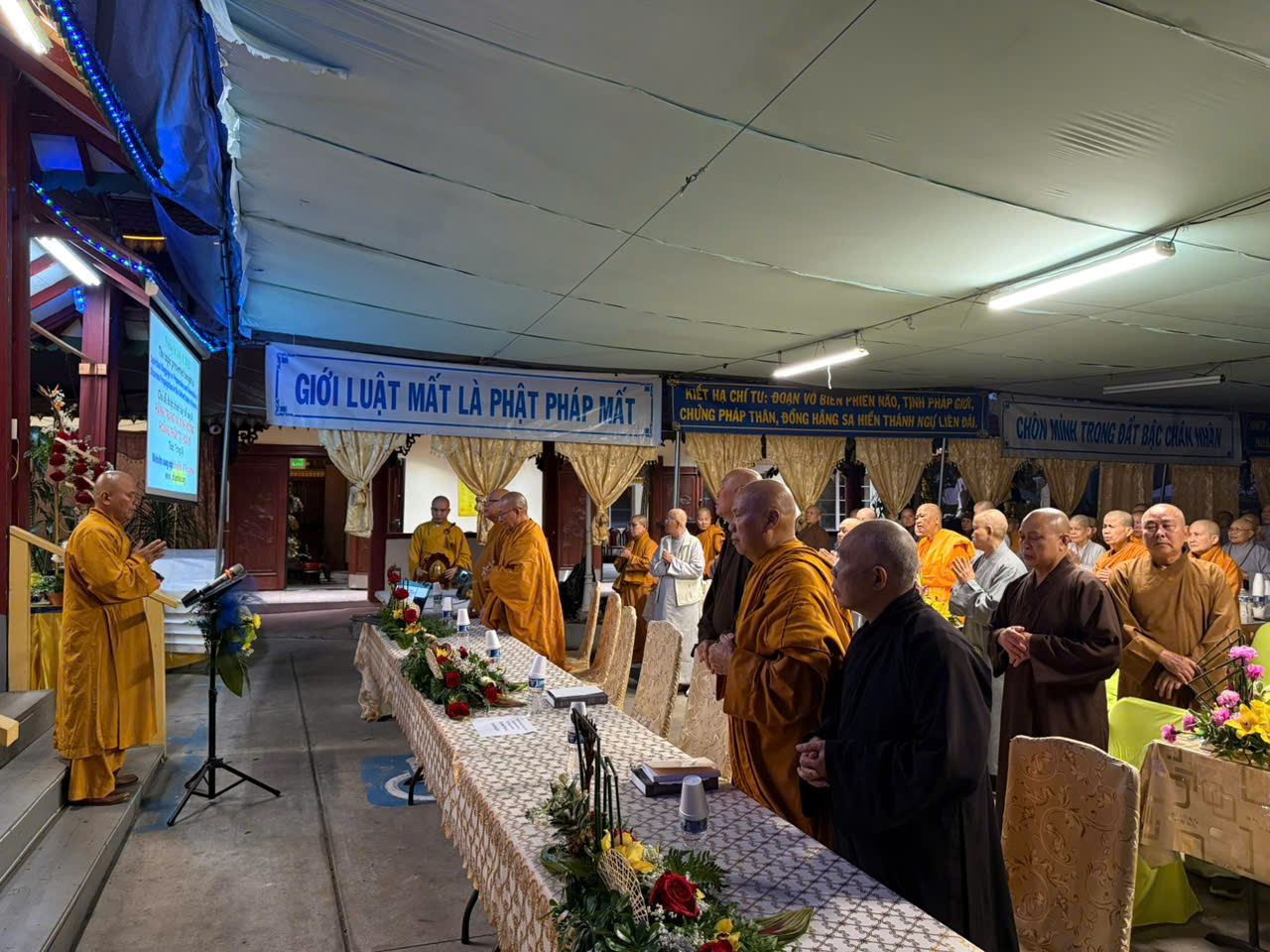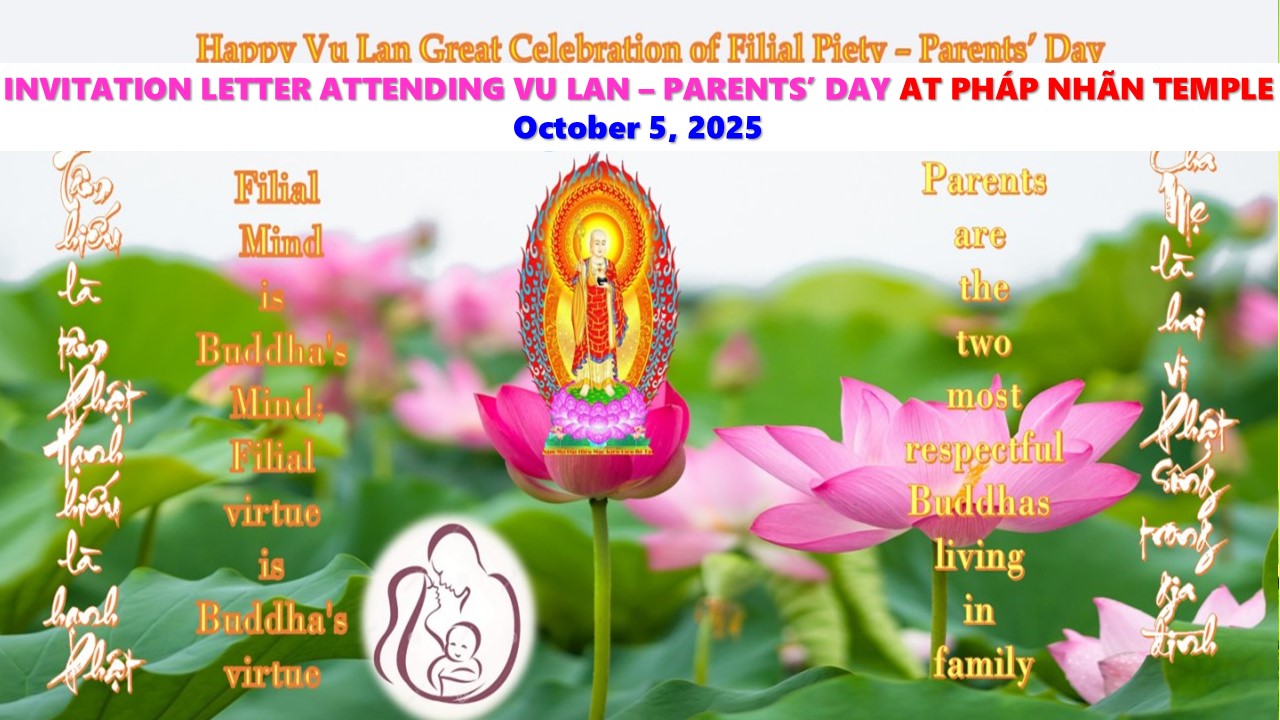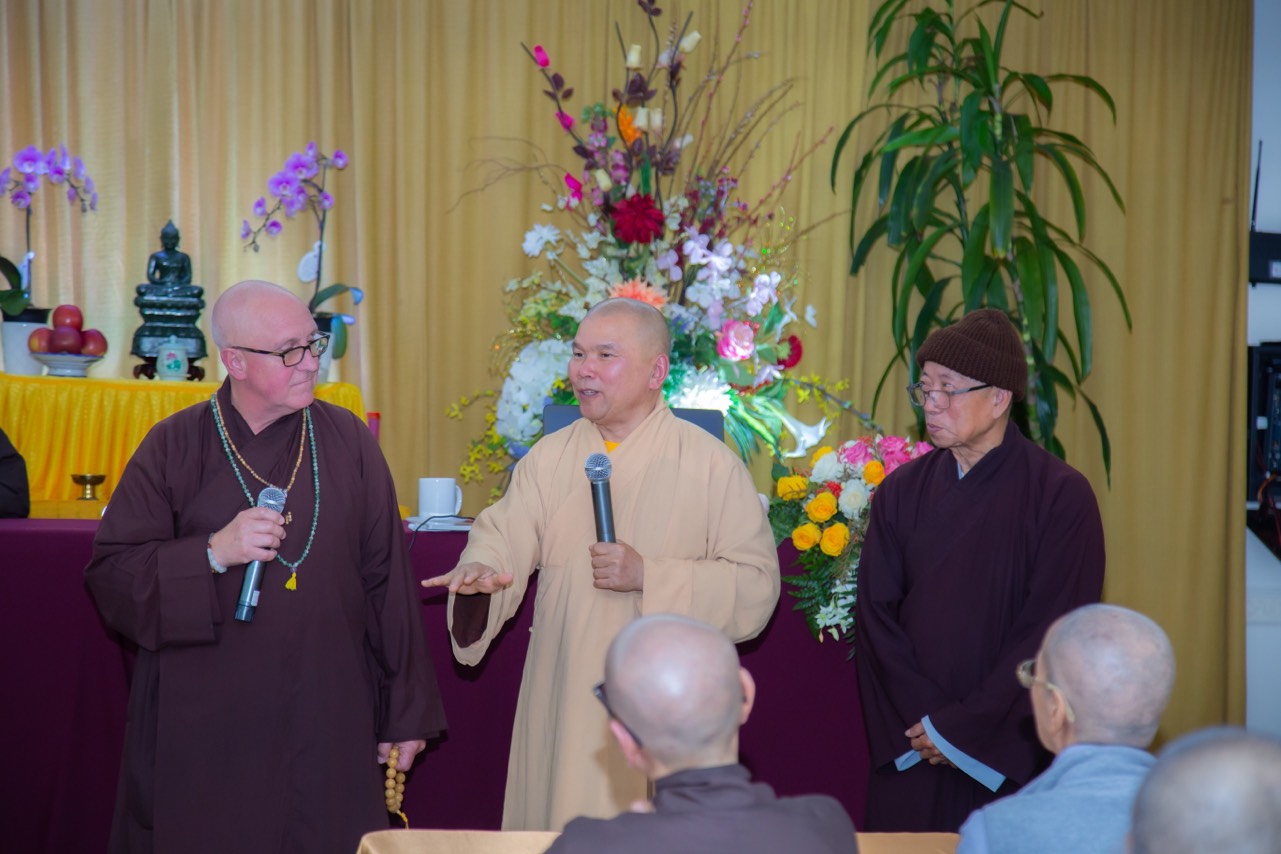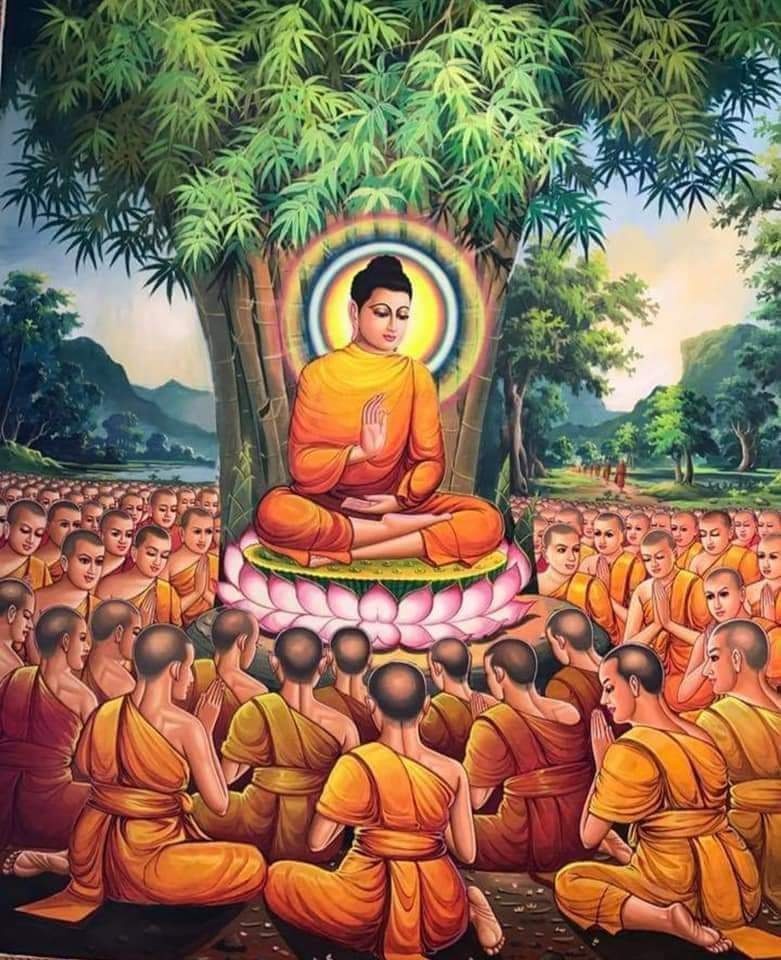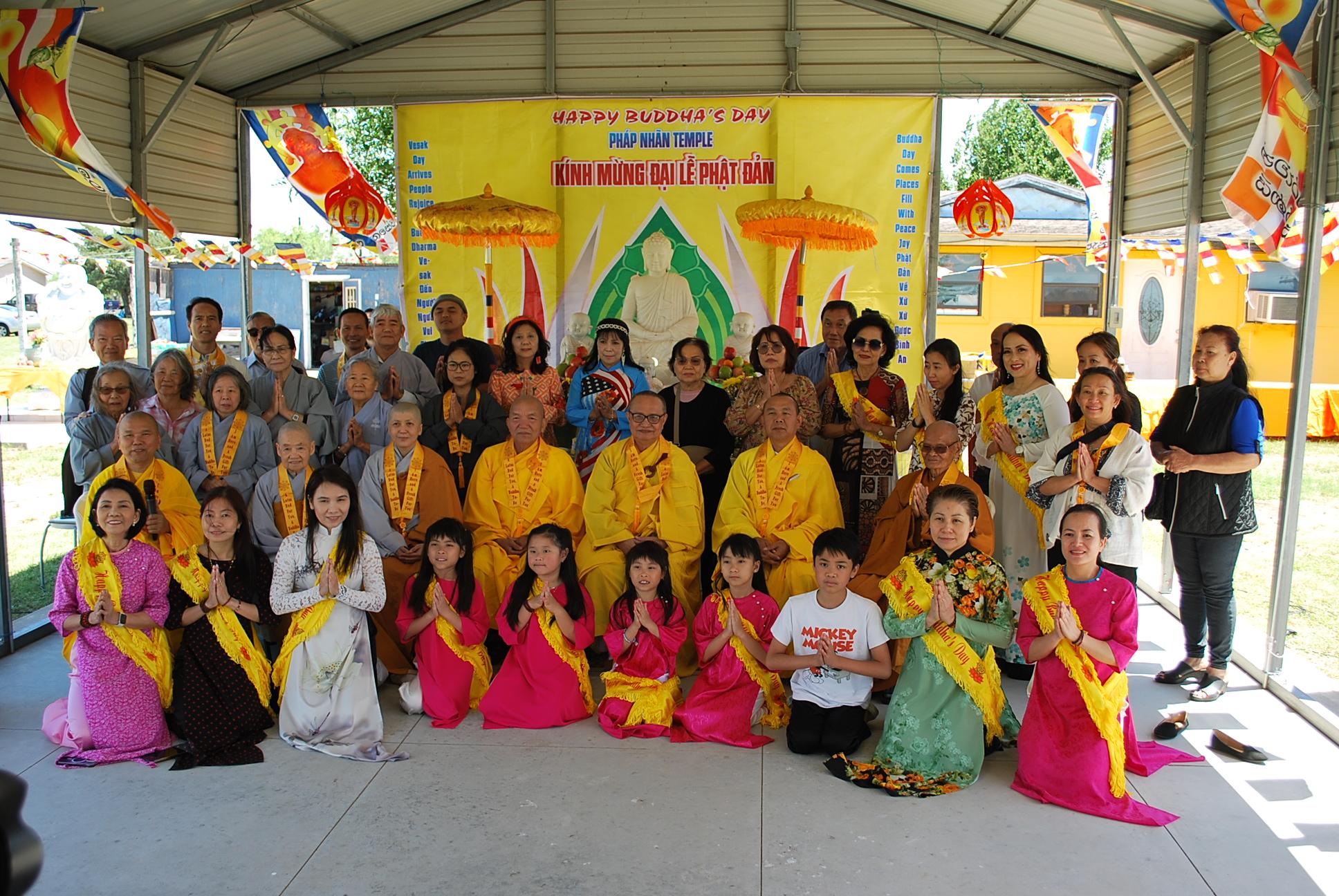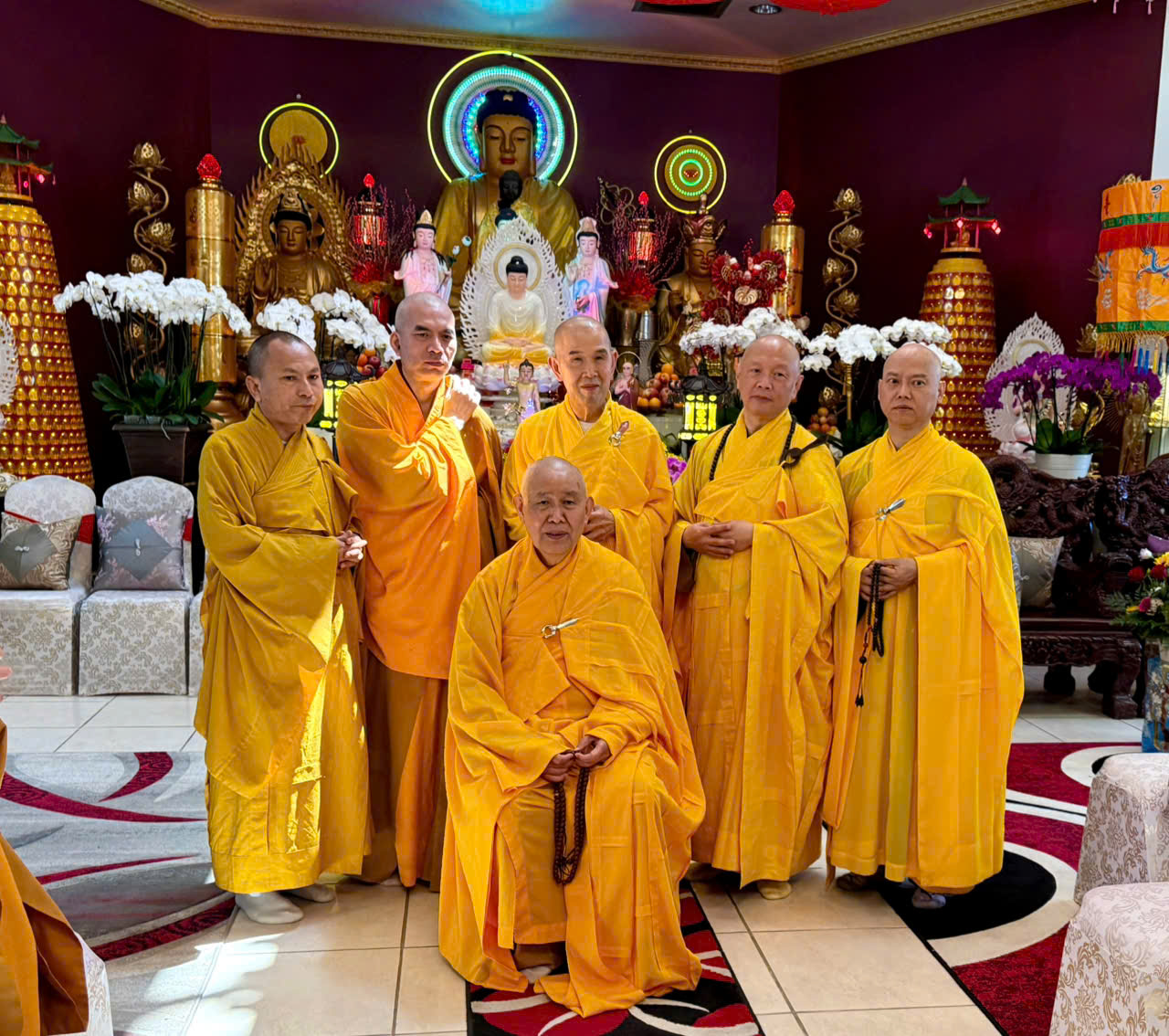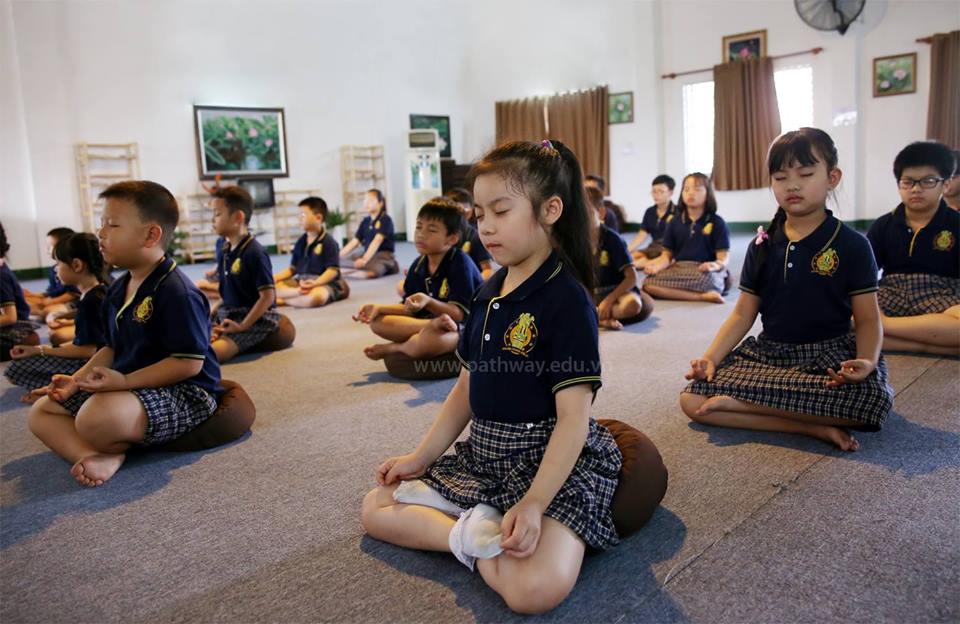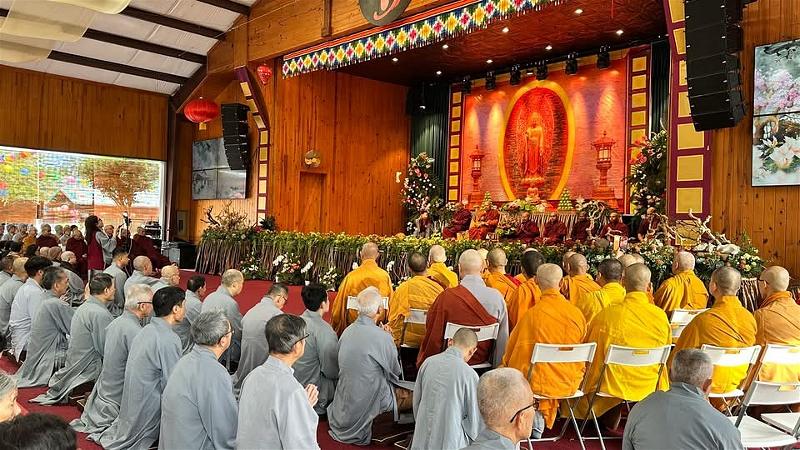
The Sound of the Buddha Dharma
In our daily lives, we know that apart from kinds of food, such as cooked rice, corn, noodles, beans, etc., we still have different kinds of food, that is, form, light, sound, fragrance, deliciousness, sweetness, sourness, bitterness, touch, smoothness, glossiness, roughness, etc., and objects of mind. These kinds of food that are the food of eyes, ears, noses, tongues, bodies, and minds are used to nurture body and mind, namely a person of five aggregates consisting of form of aggregate, feelings of aggregate, perception of aggregate, mental formation of aggregate, and consciousness of aggregate.
In this writing, the sound, one of the above-mentioned food kinds, is the food of ears, both the material food and the spiritual food for us. There are many kinds of different sounds as follows: the sounds of animals, those of vehicles, those of nature, such as thunder, tempest, rainstorm, wind, etc., the sounds of singing or music, those of the bell sound, and the sounds of the Buddha Dharma.[1]
The sounds of the Buddha Dharma are the main topic of this writing consisting of the words “the sounds” and “the Buddha Dharma.” “The sounds” mean human voice, noise, speech, chanting of Sutras, chanting of Mantras, reciting of the Buddha’s names, and the sound of noble silence, namely meditation practice.
“The Buddha Dharma” sufficiently written is the Buddha, the Dharma, and the Sangha. The Buddha means the fully enlightened and awakened One. The Dharma means His teachings, namely the five moral trainings[2] and the noble eightfold path,[3] or the noble path with eight methods of cultivation that link and interrelate with one another consist of Precepts (P. sīla), Concentration (P. samadhi), and Wisdom (S. prajñā or P. paññā). The Sangha means His disciples consist of both lay people and monastics, who vow to live their lives of exemplar, ethics, mindfulness, and awakening.
- There are many kinds of the sound: The sound of animals, that of vehicles, whistles, that of nature, like thunder, lightning, rain, wind, etc. These kinds of the sounds are not suitable for us.
- The sound of singing or music; this sound sometimes makes us deeply sad, sorrowful, depressed, suffering, disappointed, etc., and also sometimes makes us inspire melodious, gentle, tuneful, mellow, encouraging, etc.
When we hear and touch singing or music, its words which are not appropriate for our cultivated lives, make us more sorrowful, annoying, reproachful, and melancholy, we can stop and let go of them. Conversely, with the age of preaching the Dharma today, when we hear and keep in touch with singing or music, its words which are suitable for our cultivated lives, create for us many inspiring sources of peaceful joy, substance of stability and relaxation, have the ability to transmit the Buddha Dharma, we can hear and sing meditation songs, the Buddha songs, or the Dharma songs.
For example, the song of Plum village has the topic “Happiness is here and now.” You are cordially invited to listen to and sing it happily.
“Happiness is here and now.
I have dropped my worries.
Nowhere to go.
Nothing to do.
No longer in a hurry.
Happiness is here and now.
I have dropped my worries.
Somewhere to go.
Something to do.
But not in a hurry.
(Plum village song)
Indeed, when we listen, understand, sing, and contemplate the song completely, we can choose, develop, and want to become peaceful and happy practitioners right in the present moment.
- The sound of the bell
According to the ritual of the Dharma center, about at 4:00 am or at 6:30 pm, a practitioner goes to invite the bell and contemplates the bell sound like this:
“With the heart of respect and mindfulness, while I am going to invite the bell whose awakening sound can resound through the Dharma realm of the kinds of sentient and insentient beings. Through practicing the Buddha Dharma diligently, when listening to the bell sound, living beings in realms of heavens, people, Asulas, hells, hungry ghosts, and animals, can alleviate suffering, are beyond the circle of birth and death in every moment, and lead their cultivated minds to the moments of enlightenment, mindfulness, and awareness.” 19
Or:
“Listening to the sounds of the bell
defilements decrease
Bodhi increases.
People who leave hell,
escape from a fire pit,
vow to become a Buddha,
to save living beings.”
“Bodily action, verbal action, and mental action get purified,
practitioner who leads his or her mind to the sound of the bell,
vows people who listen to it get awakened,
go beyond grief and sorrow.”
“Listen to, listen to.
The wonderful sound of the bell leads practitioners to one-pointed minds”
“Listening to the bell makes defilements dispel clouds and smoke.
Mind gets calm, body gets tranquil, mouth smiles.
Breaths rely on the bell to turn back to mindfulness.
The garden of mind with wisdom flowers blossoms freshly.”
“May the sound resound through all Dharma realms,
in a remote and dark place, living beings can hear.
Those who have lost steps soon stop,
awaken an unconscious sleep to see the mindful way return.”
“Listening to the sound of the bell
One’s heart gets relaxed,
the mind gets tranquil,
the ending of dolefulness,
the practice of calmness
no attachment to craving any longer,
listen deeply to
the source of one’s wholehearted mind,
learn how to look at it again
by understanding and love.”
(The Ritual of Plum Village chanting)
According to metaphorical teachings, the bell which is understood as a Bodhisattva has the ability to arouse and to awaken the seeds of enlightenment and awareness in us to wake up. With mature practice, each time of inviting the bell or listening to it, practitioner’s mind and body become calm and relaxed. Apart from the above meanings, the sound of the bell still has the rapid, fleeting, and impermanent meaning, etc.
The above meanings are to remind us to know that life is impermanent, everything is impermanent, birth and death interact with together in every moment. When we remain healthy and young, we try to make use of suitable time to cultivate rapidly, otherwise, we will grow old. For impermanence does not await anyone, an out-breath without inhaling, means we will pass another life. Aware of that thing, we each try to cultivate to bring peacefulness and happiness to ourselves and to others right in the present life.
- The topic of Dharma talks in the Dharma article today is “The Sound of the Buddha Dharma” consisting of three kinds of the sounds: The Buddha sound, the Dharma sound, and the Sangha sound.
If we have enough wholesome conditions to pilgrim to holy places of Buddhism, we know in early morning at 4 o’clock at Bodhgaya, these kinds of the sounds are turned loudly on the whole area of the holy place. In this context,
4.a. The Buddha sound means the sound is turned on from disc machine or from practitioners chanting and reciting in many different languages, especially Pāli language; this sound is to extol and to praise the conduct of the Buddha, whose disciples skillfully know to take refuge in Him as the fully enlightened and awakened One.
Buddhaṁ saranaṁ gacchami.
I go for refuge to the Buddha, who leads and shows me the way of peacefulness and happiness in life.
Namo Buddhaya.
4.b. The Dharma sound means the sound is turned on from disc machine or from practitioners chanting and reciting in many various languages, especially Pāli language; this sound is to extol and to praise the marvelous of the Buddha Dharma, practitioners skillfully know how to take refuge in the Dharma as means of cultivation to transform Karmas and to lead to peacefulness, enlightenment, and deliverance in the present as well as in the future.
Dhammaṁ Saranaṁ Gacchami.
I go for refuge to the Dharma, the path of peace, love, and understanding.
Namo Dharmaya.
4.c. The Sangha sound means the sound is turned on from disc machine or from practitioners chanting and reciting in many different languages, especially Pāli language; this sound is to extol and to praise the purified and harmonious conduct of the Sangha, practitioners skillfully know how to take refuge in the Community of Buddhist monastics and lay people, who vow to contribute to bringing peacefulness and happiness to themselves and to others right in the world.
Sanghaṁ Saranaṁ Gacchami.
I go for refuge to the Sangha, the community of cultivated people who vow to lead their lives of ethics, exemplar, mindfulness, and awareness.
Namo Sanghaya.
The Buddha, the Dharma, and the Sangha have characteristics of interaction and interdependence never separately. Through the process of learning, understanding, practicing, and applying the Buddha Dharma into their daily lives, people who have visible eyes and even invisible eyes, after listening and being in contact with the Buddha, the Dharma, and the Sangha, have the ability to feel the Dharma joy, peace, cultivation, attainment, and Dharma enlightenment alike right in the present moment.
With our hearts of voluntariness, right view, right thought, diligence, cultivation, and learning of the Buddha Dharma, we go for refuge to the Buddha, the Dharma, and the Sangha, nobody has the right to impose and to force us. However, through the process of taking refuge in the Triple Gem, we learn the Buddha, understand the Dharma, and are peaceful practitioners, we vow to take refuge in the Three Jewels to live our lives of mindfulness and awakening. In the present, we live very peacefully, and in the future, we will live joyfully.
On the other hand, according to Sutras of Mahayana Buddhism, especially the Sutra of Universal Gate, when chanting and reciting it, we understand and know Lord Bodhisattva of Gently Compassionate Mother Quan Thế Âm has thirty-three good signs differently, such as the sign of man, that of woman, that of monastic, that of lay person, etc.
Man can be a male teacher, a father, an elder brother, a younger brother, a son, etc. Woman can be a female teacher, a mother, an elder sister, a younger sister, a daughter, etc. Monk can be a Bhikkhu, an elder brother, a younger brother in the Dharma; Nun can be a Bhikkhuni, an elder brother, a younger brother in the Dharma; lay person can be good man, good woman, etc.
As practitioners cultivating and learning the Buddha Dharma diligently, what we say, think, and do bring peacefulness and happiness to the many, we try to uphold, develop, apply, and practice it in our daily lives. Our happiness is happiness of father, that of mother, brother, sister, younger brother, and our descendants. Conversely, what we say, think, and do bring unhappiness and suffering to ourselves and to other people, we decide to stop and to let go of it. Our unhappiness is unhappiness of loved ones and relatives in both maternal and paternal families.
In our daily lives, whenever we meet unfortunates, we should say wholehearted prayers by reciting the names of Lord Bodhisattva of Gently Compassionate Mother or Lord Bodhisattva of Gently Compassionate Father in the fresh, immediately, she or he appears and helps us less suffering and more joy.
- When reciting the Universal Gate Sutra in Sino-Vietnamese words, we encounter the five different kinds of the sounds as follows: Diệu âm, Quán Thế âm, Phạm âm, Hải triều âm, thắng bỉ thế gian âm, thị cố tu thường niệm, etc.
5.1. Diệu âm means the wonderful sound, the marvelous sound, namely the sound of loving, likable, and pleasant speech between teacher and student, father and mother, wife and husband, children and descendants etc. The kind of this sound is skillfully utilized suitably, at the right place, in the right time, and in the right object, it gets valuable, therapeutic, effective, and miraculous, and it can benefit oneself and other people right in this life.
5.2. Quán Thế Âm means the name of Bodhisattva, who has the conducts of understanding and deep listening to the heart of non-prejudice, non-reproach, and non-reaction, has the ability to help people more joy and less suffering. Understanding means with the heart of lucidity, clarity, and concentration, when meeting a difficult thing, one can solve it smoothly, cheerfully, harmoniously, and entirely; deep listening is in the level of 100%. Contrary to deep listening, shallow listening or moderate listening is only in the level of 20, 40, 60%, etc. Lord Bodhisattva of Gently Compassionate Mother Quan Thế Âm has the sufficiency of the conducts of loving speech, understanding, and deep listening.
In their daily lives, when living together and clash with each other, sometimes husband and wife anger together because of business, offspring, family, society, etc. As persons with wisdom and with practice of the conduct of loving speech, understanding, and listening, each time he angers, she can wait for him to reduce anger. At that time, she starts to practice saying a couple of loving speech with him like that:
“My darling,
I knew you were angry with me.
As your darling,
I am present for you.
What you say, I would like to listen to and recognize it clearly.
Something good, I uphold and develop,
Something not good, I would like to correct, transform, and eliminate it little by little.”
Through the above-discussed things, we know that learning theory is easy, but when facing anger is not easy at all. If we practice the conduct of loving speech and listening not well, sometimes it is not easy for us to subdue our bodies and minds. Indeed, those who do not practice the Buddha Dharma diligently, when anger in them appear easily burn and lose their calm and lucid minds.
In two people, if this person angers, that one does not anger and keeps one’s calm and lucid mind, everything can be solved quietly and smoothly. However, if both get angry, they also want to fight something right about themselves, no one wants to make concessions to one another at all, everything can lead to big problems, such as disharmony, disorder, and unhappiness for themselves, for relatives, loved ones, family, and neighbors.
Indeed, when meeting complications and quarrel with each other in their families, if not practicing the conduct of loving speech, understanding, and listening, husband and wife easily break to pieces, discord, and unhappiness. Sometimes, their anger will lead their families to divorce and dispersion. They are not happy, their families are not peaceful, their children get lonely, desolate, and broken.
Being aware of that thing clearly, when wife and husband who are angry with each other try to practice the conduct of loving speech and listening by sympathy, joyfulness, and forgiveness, they can subdue and transform anger. At that time, they understand one another deeply and together build peacefulness and happiness for themselves, for families, for neighbors, and for society.
The late Most Venerable Elder Monk Thích Thiện Siêu has a meditation stanza:
“A little bit of anger,
a little bit of sulk,
trouble all whole life
can lead one to suffering.
A hundred things are let go of,
a thousand things are given up,
The mind getting free and relaxed,
can make one be happy and peaceful.”
Or, Zen Master Thích Nhất Hạnh has a meditation song as follows:
“Talking anything not good with each other
is unable to resolve anything at all.
Why not stop it
lest it leads one to deep hole.
Talking anything not good with each other,
does not lead one to a benefit.
Why not stop it
breathing gently and deeply.
Talking anything not good with each other
does not lead one to the benefit.
Why not stop it
smiling to see together.”
(Plum Village song)
Indeed, in families, union, community, and in society, those who practice the conducts of loving speech, understanding, and listening of Lord Bodhisattva of Gently Compassionate Mother Quan Thế Âm in their daily lives, they can resolve many difficult, complicated, and complex things between individual and individual, individual and collective, individual and community, and between individual and all.
Practicing the methods of loving speech, understanding, and deep listening, though simple, is very effective, it can contribute to bringing benefits, joyfulness, happiness, peace, and prosperousness for families, schools, society, nation, and to inter-nations practically right in the world.
5.3. Phạm âm that means the sound of cleanliness, purity, purification, exemplariness, manifests the way of life to practice ethics, concentration, wisdom, and four infinite states of mind: loving-kindness, compassion, altruistic joy, and equanimity.
5.3.a. Precepts (P. Sīla) means the words of reminder, admonition, encouragement, ethical principles; Precepts have the ability to protect freedom, to lead practitioners to peaceful joy and deliverance.
As devotional and exemplary Buddhist devotees, we are aware to protect natural environment, to nurture, and to develop our compassionate hearts toward living things and living beings by not killing them and not devastating mountains and forests;
Letting go of our hearts of craving, costiveness, stinginess by developing the hearts of almsgiving and not stealing public and private property; building happiness for families, couples, and offspring by living faithfully with legal wife or husband; maintaining confidence, honesty, and prestige for ourselves, other people, and for organization by practicing the conducts of loving speech and deep listening; keeping and developing health and wisdom for our bodies and minds by knowing how to love ourselves and other people, not using drugs, intoxicants, smoking, violent and debauched games, and films, etc.
5.3.b. Concentration means focusing, contemplation, selection, stopping to transform false into true, bad into good, wrong into right, dark into bright, wavering into tranquility and one-pointed mind.
5.3.c. Wisdom means understanding and lucidity by cultivation and the practice of the Buddha Dharma via good speech, thought, and actions in accordance with right view, right thought, right speech, right action, right livelihood, right effort, right mindfulness, and right concentration.
5.3.d. Loving kindness means giving joy with the heart of non-clinging and non-attachment.
5.3.e. Compassion means love with the heart of generosity, forgiveness, and tolerance.
5.3.f. Altruistic joy means delight with oneself and other people.
For example, when one’s Temple or other people’s Temple organizes successful Retreats, one is not only happy with successful organization of one’s Temple, but also happy with successful organization of other people’’ Temple.
5.3.g. Equanimity means generosity, tolerance, non-attachment, non-entanglement, and non-clinging between giver, receiver, and given things.
When understanding and practicing like this, we are people of freedom, peacefulness, and joy with our thought, speech, and deeds toward ourselves and other people. Indeed, with the wonderful sound, when practicing the ethical things and the four infinite states of mind well, practitioners who lead their moral, clean, and exemplary lives deserve to be offered, are the good rice field of blessing for everyone to sow and to plant, are praised and extolled by the intellectuals in the present as well as in the future.
5.4. Hải triều âm means the sound of the sea waves; this sound represents the sound of the collective, the strength of the collective, the uniformity of the collective in the spirit of cultivation, learning, harmony, solidarity, mutual support, mutual affection, mutual love, and mutual respect. The sound of the sea has ever been greater than the sound of the river. The sound of the collective and the strength of the collective have ever been more stable than the strength of individual.
The sea symbolizes immensity, vastness, spaciousness, extensiveness, magnanimity, acceptability, encompassment, comprehension, non-discrimination, non-differentiation, etc.; the river symbolizes narrowness. The sea represents the collective, the many, and the great assembly with cultivation, learning, peacefulness, solidity, leisureliness, mindfulness, and awareness; the river symbolizes individual with cultivation, learning, and peacefulness. Whenever the individual has the energy to cultivate, that energy is not so strong as the cultivated energy of the great assembly.
Indeed, we know when a collective group cultivates well, the collective group creates spiritual strength, harmony, solidarity, solidity, and freedom with the great prestige and fast influence on the public in society. An individual cultivates well, the influence of that individual to the many in society is not strong.
However, the collective with cultivation is first of all that the collective must begin from cultivation of every individual. A great assembly with peacefulness is first of all that the great assembly must begin from peacefulness of every individual. An individual with happiness is first of all that the individual must begin from his or her own inner mind with happiness. Many individuals that have cultivation and peacefulness create a collective with solid majesty of ethics and exemplary. With cultivation and penetration of the Buddha Dharma, that collective has the ability to bring peace and prosperousness not only to their nation, but also to other people’s nations all over the world.
When reciting, chanting, and contemplating the Ullambana Sutra, we know clearly that: With filial piety of the elder monk Moggallāna, after obtained enlightenment, the elder monk made use of supernatural power to go down to hell to save his mother, but alone he could not save her, immediately returned to Monastery, and said respectfully to the Buddha: “Can you teach and show me the method to save my mother? The Buddha taught: “If your mother wants to be saved from the hell, first of all, on occasion of the Summer or Raining Retreat (vassa vassa), you should go to invite the Sangha to say collective prayers for her. Thanks to compassionate and collective energies and cultivation of the great assembly, relying on these energies, your mother can escape from the hell.”
The above meanings emphasize that the cultivation of the many is important, the energy and strength of cultivation of the great assembly are important. When a family cultivates, a collective cultivates, a community cultivates, or the Sangha cultivates the Buddha Dharma well, all have more solid energies than an individual does. Thanks to the results of good cultivation like this, they can build, consolidate, and bring the so many foundations of ethics, loving-kindness, compassion, wisdom, and peace to society.
On the other hand, hải triều âm (the sound of the sea waves) is still exemplified the strength and a lion’s roar; whose roar has the ability to make animals terrified, hidden, and fled. The lion symbolizes both individual and the great assembly. In this context, the lion symbolizes the great assembly more than the individual.
With cultivation, learning, understanding, and practice of the Buddha Dharma in their daily lives, they have many energies of spirituality, ethics, stability, and freedom. These energies have the ability to extinguish defilements of greed, anger, delusion, arrogance, doubt, wrong view, etc.
In this writing, hải triều âm (the sound of the sea waves) is to emphasize the strength of harmony, solidarity, and cultivated energies of the collective and the great assembly. Communities, agencies, and mass organizations have good conditions to cultivate and learn the Buddha Dharma fully peacefully, they actually have the ability to contribute to bringing peace and prosperousness, joy and happiness very much to the many all over the planet.
- Thắng bỉ thế gian âm, thị cố tu thường niệm, this is a Sino-Vietnamese phrase.
Thắng means predominate over, surpass. What surpasses? The sound of the Buddha Dharma surpasses the sound of the world; Bỉ means that person, that thing, namely the sounds of win and loss, reproach, sulk, anger, deep sadness, furiousness, etc. According to the meaning of practicing the Buddha Dharma not well, thế gian âm which is the sound of the world brings and accumulates the scramble, melancholy, envy, sorrow, etc. This sound is the sound of creating Karma (action), that of binding, fastening, and clinging, etc.
Contrary to the sound of the world is the sound of the Buddha Dharma; the sound of the Buddha Dharma encompasses the kinds of the sounds as follows:
the sound of chanting Sutras
the sound of chanting Mantras
the sound of reciting the Buddhas’ names, and
the sound of wordlessness or noble silence;
the sound of wordlessness means the sound of meditation practice.
Normally, when reading, learning, hearing, seeing, and understanding, we know a famous sentence at the meditation gate as follows:
“Speaking as the right Dharma, and noble silence as the right Dharma.”
Speaking as the right Dharma means in the morning, speaking something wholesome; in the afternoon, speaking something wholesome; in the evening, speaking something wholesome, we have a joyful day and night. Besides speaking wholesome things, we still think of wholesome things, and do wholesome things, we have the whole of twenty-four joyful hours.
Speaking wholesome things means we practice and apply to chant Sutras, Mantras, and recite the Buddha’s names in our daily lives. Speaking wholesome things has the ability to bring happiness, peacefulness, solidarity, harmony, and peace to ourselves and other people right in the here and in the now in the present life.
Noble Silence as the right Dharma means we should apply meditation practice into our daily lives. When standing, going, sitting, lying down, working, talking, silencing with ourselves and other people, we are in states of mindfulness and awareness, solidity and calmness, peacefulness and happiness.
Thị cố tu thường niệm is the Sino-Vietnamese phrase, meaning the above-discussed things, we must remember carefully to select, to cultivate, to transform, to practice, and apply them into our daily lives suitably.
In conclusion, through the above-mentioned practical meanings, we clearly know the sound of the Buddha Dharma is the sound of awakening, enlightenment, deliverance, peace, joy, etc. This sound has never contained the seeds of greed, anger, delusion, arrogance, doubt, wrong view, etc. It is very extraordinary, and can surpass all other sounds of the world. It has the ability to transform karmas (actions) and leads people, society, and world to authentic peacefulness, happiness, and peace in life.
When having suitable time, we skillfully apply and practice the sound of the Buddha Dharma in our daily lives by chanting Sutras, Mantras, reciting the Buddha’s names, and practicing meditation. We can transform non-good Karma into good Karma, defilements into Bodhi, suffering into peacefulness and happiness, etc. Understanding and practicing so, we not only have one day and one night of peaceful joy, but also one week, one month, one year of peacefulness, many years of peacefulness, and the whole life of peacefulness. When we have already had peacefulness, we can share peaceful joy and happiness for the many all over the planet.
May you all be well, happy, peaceful in the sound of the Buddha Dharma.
Namo the Bodhisattva Lord of Gently Compassionate Mother Quan Thế Âm.
Namo the Venerable Elder Maha Moggallāna’s Great Piety.
.
[1]http://www.youtube.com/watch?v=5ac-w_ocwFk&feature=youtu.be
[2] The five moral trainings consist of 1. Nurturing the heart of loving kindness and compassion toward living things and beings, 2. Developing the heart of alms-giving, 3. Building happiness for family, spouse, and children, 4. Holding confidence, truth, and prestige for oneself and for community, 5. Nurturing wisdom by knowing to love oneself and other people, and being aware that the use of drugs, intoxicants, gambling, smoking, playing games, watching violent and debauched films and pictures will water toxins and do harm to one’s life.
[3] The noble Eightfold Path consists of right view, right thought, right speech, right action, right livelihood, right effort, right mindfulness, and right concentration.
.


